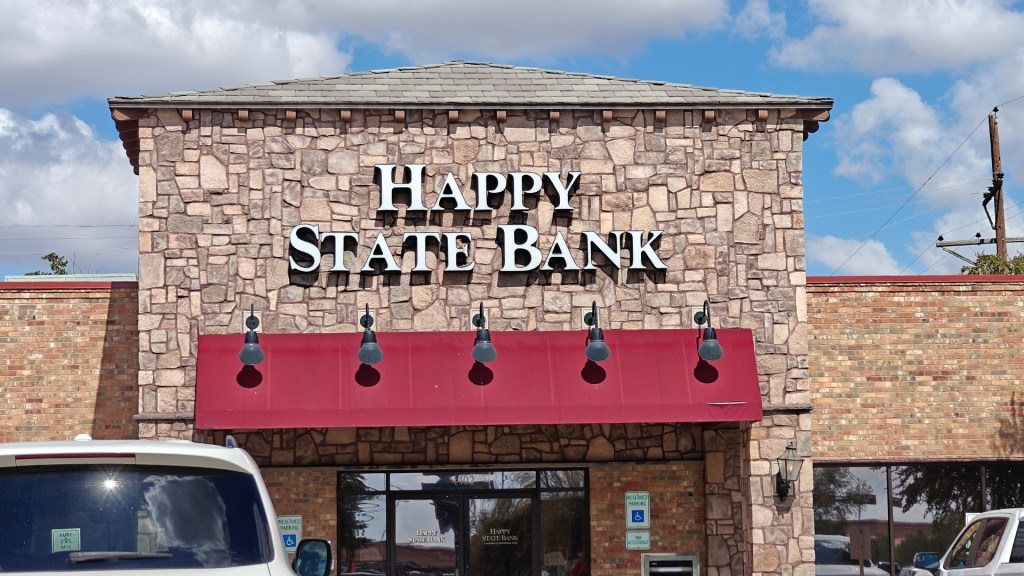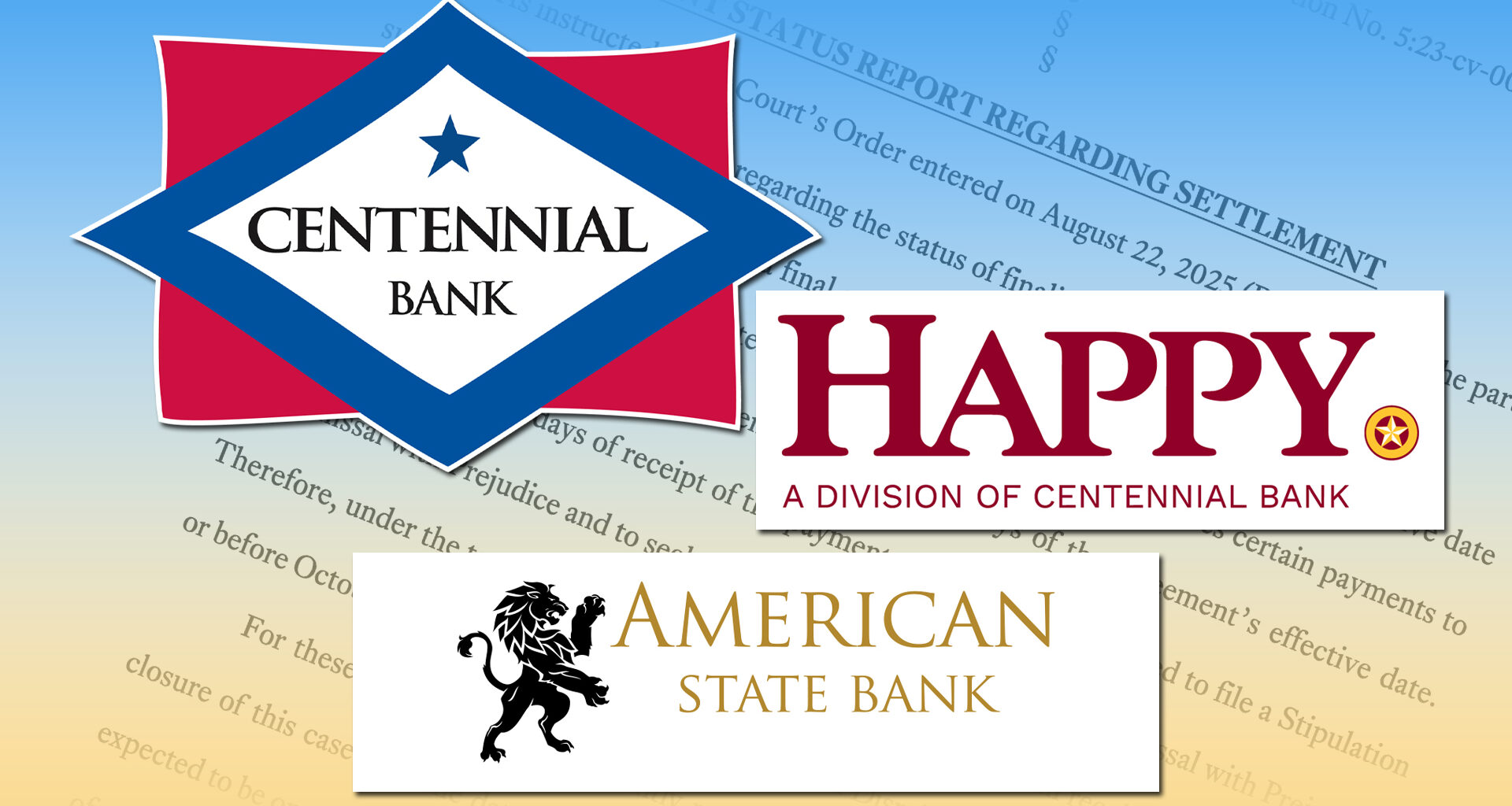When West Texas-based Happy State Bank was bought a few years ago by Arkansas-based Centennial Bank, it set off a chain of events leading to a legal battle involving bankers and investors that finally ended in a settlement. Both sides filed a joint dismissal Friday – awaiting one last signature from a federal judge.
No dollar figure was given in court records, but there are details on the legal battle and a general sense of how much some bank investors are getting back.
After Centennial bought Happy State Bank (HSB) spanning 2021 and 2022, Jerry “Bud” Holmes – Happy’s Lubbock market president – and others left Happy for Tyler-based American State Bank (ASB), which was expanding into Lubbock, Plainview, Littlefield and other cities.
(The Tyler-based American State Bank is not the American State Bank which operated in Lubbock before it was bought in 2012 by Prosperity Bank.)
In 2023, Centennial sued Holmes and others – claiming violations of the federal Defend Trade Secrets Act, breach of contract, unfair competition and a few other things. Holmes said the information was public.
ASB is no longer in West Texas.
Federal regulators put ASB on their radar. In March 2024, the bank agreed to submit a plan to the federal reserve to “improve the bank’s condition.” That included credit risk management. (Click here to read it.)
One of its two parent companies, Steele West Texas Capital Corporation, filed for Chapter 7 bankruptcy last year. Chapter 7 is for a business that cannot afford to pay its creditors and is also known as liquidation bankruptcy.
Holmes eventually became an executive vice president with another bank with locations in West Texas including Lubbock.
The battle impacted real people – for example Angie Castillo, the owner of Three Dog Bakery. She lost her business which we detail in this related story.
ASB and attorneys for Holmes have chosen not to respond to more than one request to comment. Centennial also chose not to respond to a request.
Happy State deal – a ‘bank in a box’
Centennial Bank reached a tentative settlement in March with Holmes and other former HSB employees. Terms were not disclosed.
In that lawsuit, Centennial claimed Holmes was angry after the merger – thinking he should have received higher compensation – and sought “revenge.”
According to Centennial’s lawsuit, Holmes accessed various spreadsheets containing Happy State Bank’s “most valuable and sensitive” confidential information.
 19th Street at Quaker Avenue Credit: Staff photo
19th Street at Quaker Avenue Credit: Staff photo
According to the lawsuit, Holmes packed all this information together – such as loan information, operations, revenues, profits, losses, employee compensation, customer information and so forth. Centennial called it a “ready-to-use ‘Bank in a Box.’”
Centennial claimed almost all the employees prioritized by Holmes left HSB for ASB within days of Holmes’s departure.
Holmes denied wrongdoing – especially the taking of trade secrets.
In his legal filing, Holmes claimed, “Even assuming such material can be considered a trade secret, Holmes discovered them by independent means and relationships without breaching any legal duties or using other improper means. … Further, the information is in the public domain.”
According to another court document, Holmes and other defendants asked for logs and data from Digital Guardian – a company Centennial used – “that would show if and when any of the defendants copied, deleted, or transferred any file on Happy’s computer system.
Centennial admitted, “… It failed to retain any logs from Digital Guardian at all.”
An expert witness for several defendants filed a statement saying Centennial misunderstood innocent activity (such as moving and deleting emails at the request of the bank’s I.T. department) as evidence of wrongdoing.
ASB collapse in West Texas
Steele West Texas Capital Corporation filed for bankruptcy in February 2024. In April of this year, the bankruptcy trustee proposed a settlement – approved about a month later by a judge in Tyler.
The settlement request said in 2022, ASB “caused the formation” of a company called Steele West Texas Capital Corporation. The company offered up to $83.1 million of common stock for $1,000 per share.
“ASB’s attempted expansion into the West Texas Market was unsuccessful in large part due to inadequate capital to fund operations in West Texas and ASB ultimately closed the West Texas [locations] and separated from the former Centennial employees.”
legal documents
“Ultimately, SWTCC raised $37,965,000 … and issued 37,965 shares of SWTCC stock to approximately 130 investors,” the settlement request said. So, ASB was about $45 million short to support its plan.
“ASB’s attempted expansion into the West Texas Market was unsuccessful in large part due to inadequate capital to fund operations in West Texas and ASB ultimately closed the West Texas [locations] and separated from the former Centennial employees.”
Holmes was among those who lost their jobs with ASB. They also stand to lose much of the value of their investments in the failed ASB expansion.
Holmes invested $411,000, according to the bankruptcy claims register.
Steele West Texas Capital already had a 7 percent ownership of ASB in the form of non-voting stock. Under the terms of the settlement, that number went to just under a third. Based on the ASB’s FDIC report, investors get more than half the equity value of their investment back – at least on paper. The actual cash value could be significantly less.
Really complicated settlement
Even after everyone came to a settlement in March, according to court records, it couldn’t be wrapped up at that time.
“The settlement of this action is, and continues to be, complex,” a joint request in the lawsuit from Centennial and ASB said.
Centennial was to get paid from “… insurance companies for defendants and a payment to be made in the future by a financial institution that is not a party to this case …”
The other “financial institution” is Texas Capital Bank, which sued Steele Bankshares – one of ASB’s two parent companies – in an unrelated case in Dallas County. Texas Capital won a judgment, which then led to a court-supervised sale of shares in Steele Bankshares.
Court records said Texas Capital Bank “… agreed to make a payment to Centennial based on certain contingencies …”
Last month both sides in the Centennial lawsuit said those contingencies (including developments in bankruptcy court with the 130 shareholders we mentioned earlier) are solved.
Related
Related posts



